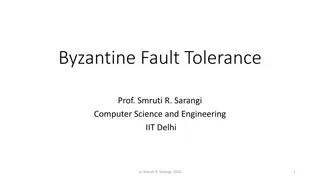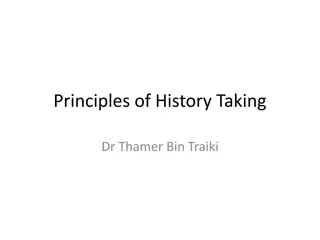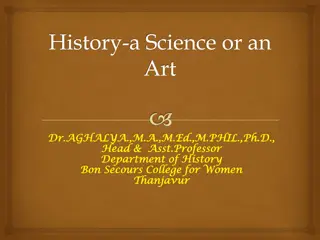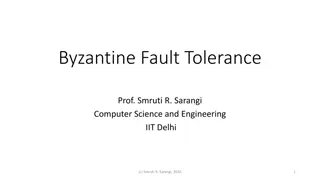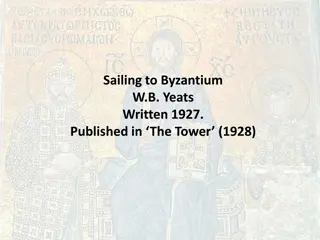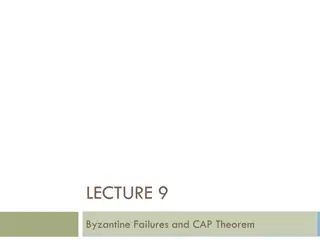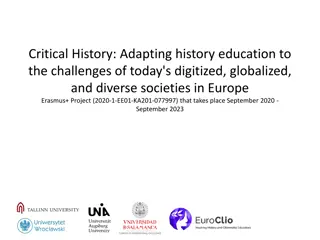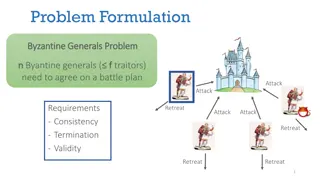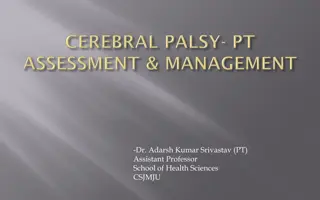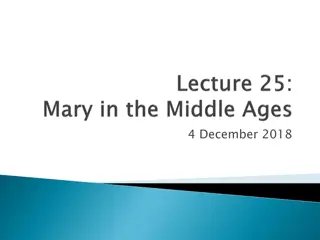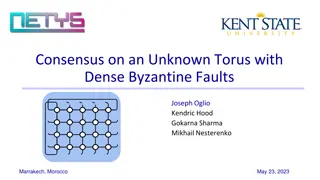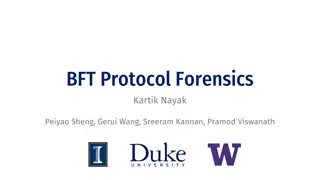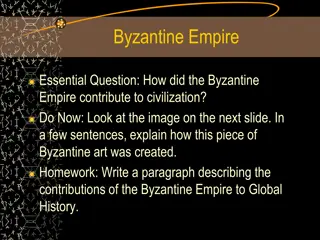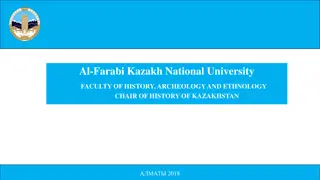Overview of Distributed Systems: Characteristics, Classification, Computation, Communication, and Fault Models
Characterizing Distributed Systems: Multiple autonomous computers with CPUs, memory, storage, and I/O paths, interconnected geographically, shared state, global invariants. Classifying Distributed Systems: Based on synchrony, communication medium, fault models like crash and Byzantine failures. Comp
9 views • 126 slides
Understanding Byzantine Fault Tolerance in Distributed Systems
Byzantine fault tolerance is crucial in ensuring the reliability of distributed systems, especially in the presence of malicious nodes. This concept deals with normal faults, crash faults, and the challenging Byzantine faults, where nodes can exhibit deceptive behaviors. The Byzantine Generals Probl
0 views • 29 slides
Principles of History Taking in Clinical Assessment
History taking is a crucial process in patient assessment, aiding in determining the etiology of medical issues. Obtaining an accurate history through proper questioning, active listening, and maintaining a professional appearance is vital for making accurate diagnoses. The history should follow a s
1 views • 35 slides
Essential Skills for Musculoskeletal History Taking
History taking is crucial in diagnosing musculoskeletal conditions, with a clinician being 60% closer to a diagnosis with a thorough history. This session covers the structure of history, MSK systemic review, pain assessment, swelling evaluation, and more. Students will learn to take a relevant hist
0 views • 24 slides
Is History a Science or an Art? Debating the Nature of Historical Study
Opinions are divided on whether history should be classified as a science or an art. While history employs techniques similar to scientific methods for research, certain aspects distinguish it from traditional sciences. Arguments against history as a science include the inability to forecast, the co
0 views • 12 slides
Understanding Uterine Cancer and Postmenopausal Bleeding
Dr. Khalid Akkour, Assistant Professor of Gynecologic Oncology at King Saud University Medical City, provides insights on uterine cancer and postmenopausal bleeding. The structured OSCE discusses important aspects such as taking a focused history, age, ethnicity, past gynecologic and obstetric histo
0 views • 154 slides
Various Branches of History Explored
Explore different branches of history such as Political History, Constitutional History, Parliamentary History, Legal History, Military History, Diplomatic History, and Social History. Each branch delves into specific aspects of the past, shedding light on politics, governance, warfare, diplomacy, a
1 views • 18 slides
Understanding Byzantine Fault Tolerance: A Comprehensive Overview
Byzantine Fault Tolerance (BFT) is a critical concept in computer science, addressing faults in distributed systems. This summary covers the types of faults (normal, crash, Byzantine), implications of Byzantine faults, Byzantine Generals Problem, impossibility results, and the complexity of solving
3 views • 29 slides
Exploring "Sailing to Byzantium" by W.B. Yeats: Symbolism and Themes
Delve into W.B. Yeats' iconic poem "Sailing to Byzantium" as it explores themes of art, transcendence, and the ideal state of mind beyond life. Discover the symbolism of Byzantium as an aesthetic haven where artists strive for perfection and transcendence. Unpack the impersonal nature of Byzantine a
0 views • 10 slides
Round-Efficient Byzantine Broadcast Under Strongly Adaptive and Majority Corruptions
This paper discusses a round-efficient Byzantine broadcast protocol that addresses strong adaptive adversaries and majority corruptions. The protocol involves unique and unbreakable peer signatures, committees for message verification, and time-locking mechanisms to prevent message tampering. By uti
1 views • 5 slides
Economic Models of Consensus on Distributed Ledgers in Blockchain Technology
This study delves into Byzantine Fault Tolerance (BFT) protocols in the realm of distributed ledgers, exploring the complexities of achieving consensus in trusted adversarial environments. The research examines the classic problem in computer science where distributed nodes communicate to reach agre
0 views • 34 slides
Byzantine Failures and CAP Theorem Overview
Byzantine failures refer to arbitrary patterns of failures where nodes exhibit inconsistent behavior. This lecture discusses Byzantine agreement and the challenges in reaching consensus with faulty nodes. It explores the minimum number of processes needed for consensus and extends the concepts to ge
1 views • 32 slides
Distributed Consensus Models in Blockchain Networks
Economic and technical aspects of Byzantine Fault Tolerance (BFT) protocols for achieving consensus in distributed ledger systems are explored. The discussion delves into the challenges of maintaining trust in adversarial environments and the strategies employed by non-Byzantine nodes to mitigate un
0 views • 34 slides
Geometric Routing Concepts and Byzantine Fault Tolerance
Geometric Routing enables routing without overhead, where each node knows its global coordinates and forwards messages based on proximity to the destination. Byzantine Faults pose challenges with arbitrary node behavior, but a Byzantine-Robust Geometric Routing algorithm addresses this in a 3-connec
2 views • 33 slides
Exploring the Significance of Studying History and Its Impact on Future Careers
Delve into the relevance of studying history and how it shapes future career opportunities. Discover insights from renowned history graduates and the valuable transferable skills gained from a history degree. Uncover the essence of history, its applications in modern society, and the importance of l
0 views • 16 slides
Enhancing History Education for Today's Societal Needs: Erasmus+ Project 2020-2023
This Erasmus+ project aims to adapt history education to modern challenges by preparing history educators to teach in a way that meets societal demands and incorporates the latest in history didactics. Partners focus on heritage, global dimensions, public history, and the role of the internet. Resul
1 views • 4 slides
Understanding Gynecological History Taking
This guide explores the process of taking a gynecological history, emphasizing the importance of thoroughness and patient permission. From introductions to obtaining consent, the steps involved in gynecological history taking are outlined. Attention is given to the nuances of gynecological versus ge
0 views • 18 slides
Navigating American History: Honesty, Humility, and Hope in the 21st Century
History is a subject full of debate and interpretations influenced by the current societal divisions. The teaching of American history is undergoing significant challenges, particularly regarding issues of race and equality. The 1619 Project aims to reframe American history by addressing the foundat
0 views • 19 slides
Exploring Conflict and Compromise in History Through National History Day 2018
National History Day 2018 focuses on the theme of Conflict & Compromise in History, encouraging students to delve into topics such as failed compromises leading to revolutions, the Vietnam Generation, and conflicts like the Troubles in Ireland. Through research, students will explore historical cont
0 views • 18 slides
Exact Byzantine Consensus on Undirected Graphs: Local Broadcast Model
This research focuses on achieving exact Byzantine consensus on undirected graphs under the local broadcast model, where communication is synchronous with known underlying graphs. The model reduces the power of Byzantine nodes and imposes connectivity requirements. The algorithm involves flooding va
0 views • 7 slides
Byzantine Generals Problem in Distributed Systems
The Byzantine Generals Problem addresses how a group of generals, some of whom may be traitors, can reach a consensus on a battle plan while ensuring consistency, termination, and validity. Various protocols are explored to handle challenges such as faulty leaders, consistency violations, and cheati
0 views • 23 slides
Comprehensive Developmental Assessment Process in Pediatric Physiotherapy
This detailed guide covers the subjective examination, history review, prenatal history, perinatal history, postnatal history, and behavioral assessment of children for a comprehensive developmental assessment. It includes aspects such as parental observations, pregnancy complications, birth details
0 views • 71 slides
Understanding Medical Records: History, Physical Examination, and Abbreviations
Medical records play a crucial role in documenting a patient's medical history and findings from physical examinations. The history and physical (H&P) document includes subjective information from the patient and objective observations by the examiner. The history (Hx) record covers personal medical
0 views • 20 slides
Influence of Mary in Byzantine and Western Art Through the Ages
The influence of Mary, the mother of Jesus, in Byzantine and Western art is explored through various historical events and artworks. From early visions of Mary to the declaration of Feast of Dormition, the devotion to Mary has shaped artistic representations and church dedications. Iconic cathedrals
0 views • 18 slides
Byzantine Faults and Consensus on Unknown Torus
The discussion revolves around achieving consensus in the presence of dense Byzantine faults on an unknown torus. Various challenges and impossibility theorems are explored, highlighting the complexities of reaching an agreement in such fault-prone environments. The content delves into the limitatio
0 views • 23 slides
Uncovering Newport's Rich History: A Project by NKU's Public History Department
Delve into the fascinating history of Newport's West Side through the research conducted by NKU's Public History Department. Students have explored key locations, culminating in a comprehensive written history that highlights the area's significance. Discover insights from the city's establishment i
0 views • 7 slides
Sync HotStuff: Practical Synchronous State Machine Replication
Sync HotStuff is a practical synchronous protocol that tolerates Byzantine replicas and handles weaker synchrony models. It overcomes issues of requiring a large number of rounds and lock-step execution. The protocol ensures safety by committing blocks and guarantees liveness by continuing to commit
0 views • 15 slides
Byzantine Fault Tolerance: Protocols, Forensics, and Research
Explore the realm of Byzantine fault tolerance through protocols like State Machine Replication and HotStuff, discussing safety, liveness, forensic support, and the impact of Byzantine faults. Dive into decades of research on achieving fault tolerance and examining forensic support in the face of By
0 views • 24 slides
The Contributions of the Byzantine Empire to Civilization
The Byzantine Empire made significant contributions to civilization through art, law, religion, and centralization of government. The empire's legacy includes the preservation of Roman laws, promotion of Christianity, accumulation of church wealth, and establishment of Constantinople as a key center
0 views • 22 slides
Three Stages of Christian Spiritual Growth: A Journey of Faith
Exploring the gradual progress of the Christian life through three stages - from the leap of faith to walking the spiritual path guided by method and tradition. This journey entails learning, understanding, and reaching enlightenment, drawing insights from Byzantine spiritual traditions and ancient
0 views • 12 slides
Efficient Medical History Taking Guidelines
Medical history taking is a crucial step in diagnosis, involving the patient's account of illness and relevant information. Following a structured framework helps identify potential diagnoses. Key elements include personal information, chief complaint, presenting illness history, review of systems,
0 views • 51 slides
Al-Farabi Kazakh National University - History, Archeology, and Ethnology Department Overview
The History Department at Al-Farabi Kazakh National University, established in 1958, offers a range of courses on the history of Kazakhstan, including Ancient and Medieval History, Soviet Kazakhstan, and more. The department has a rich history of notable heads and focuses on educational, methodologi
0 views • 7 slides
Perspectives on the Historiography of the Crusades
The historiography of the Crusades explores diverse viewpoints from western and eastern sources throughout different periods. Various leaders, including Byzantine emperors, Muslim sultans, and indigenous populations, had unique perspectives. The evolving attitudes towards the Crusades reflect changi
0 views • 25 slides
Optimally Resilient Asynchronous Multi-Valued Byzantine Agreement
Exploring the challenges and solutions in achieving optimally resilient asynchronous multi-valued Byzantine agreement protocols. This work presents a novel construction meeting key requirements and delves into round-preserving parallel composition of agreements, shedding light on probabilistic termi
0 views • 19 slides
Ophthalmology History Taking: Importance and Components
Ophthalmology history taking is crucial for identifying and narrowing down differential diagnoses, screening for hidden diseases, and protecting patients from harm. Components include patient profile, chief complaint, history of present illness, past ophthalmic and medical history, drug and family h
0 views • 24 slides
Quantum Distributed Proofs for Replicated Data
This research explores Quantum Distributed Computing protocols for tasks like leader election, Byzantine agreement, and more. It introduces Quantum dMA protocols for verifying equality of replicated data on a network without shared randomness. The study discusses the need for efficient protocols wit
0 views • 28 slides
The Byzantine Empire: Society, Achievements, and Decline
The Byzantine Empire, established in 527 A.C, was marked by religious conflicts and military advancements. The society was patriarchal, centered around Christianity, and had a hierarchical structure. The empire made significant progress in weaponry and trade, although frequent battles ensued. Despit
0 views • 7 slides
Byzantine Empire and Eastern Orthodox Church Overview
The Byzantine Empire, also known as the Eastern Roman Empire, flourished from 330 CE to 1453 CE under Greek rule. It played a significant role in trade, politics, and culture during the Post-Classical Era, connecting trade routes and reconquering the West under rulers like Justinian. However, challe
0 views • 9 slides
Secure Append-Only Memory for Byzantine Fault Tolerance
Explore the concept of Attested Append-Only Memory (A2M) in distributed systems, which ensures adversaries adhere to their commitments. Learn about safety and liveness goals, Practical Byzantine Fault Tolerance (PBFT), equivocation issues, and the A2M log and interface for secure data management. Di
0 views • 34 slides
Communication Complexity in Byzantine Agreement Research
The presentation discusses communication complexity in Byzantine Agreement, emphasizing a lower bound of (f/2) when After the Fact removal is considered. It explores two major contributions - the communication lower bound in randomized protocols and near-optimal subquadratic Byzantine Agreement. The
0 views • 9 slides

